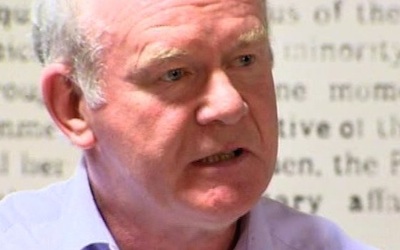
Sinn Fein’s Martin McGuinness has used a keynote speech marking the 20th anniversary of the 1994 IRA ceasefire to call for republican armed groups to lay down their arms.
In a speech in the Creggan area of Derry, the Six-County Deputy First Minister said there was an enormous onus “on those who recognise the enormous progress we have made, and continue to make, since the IRA cessation in 1994 to make their voices heard”.
“There can be no return to the violence and repression that scarred this society for so long,” he said.
“I would urge dissident republicans still committed to armed actions to take that same step in 2014 into politics and away from conflict.”
The announcement of the 1994 ceasefire came in the midst of intensive political talks which ultimately led to the Good Friday peace Agreement. The ceasefire collapsed in 1996 before being reinstated the following year.
“The absence of dialogue and a commitment to dialogue as the way to overcome disagreements is at the heart of the growing difficulties we are now facing in the Peace Process across a range of key issues,” McGuinness said in his keynote speech.
He said that rather than making progress on the issues of identity, parading and the past by building on the talks led by Richard Haass and Meghan O’Sullivan, the two main unionist parties had retreated into a coalition with ‘rejectionist’ unionism and loyalist paramilitaries.
He said unionists had failed to accept a democratic decision on the flying of flags at Belfast city hall.
“Three times in the last six months, the DUP have threatened the political institutions if they do not get their own way,” he said.
“But the real threat to the political institutions is stagnation and the absence of progress. The real threat is the retreat of political unionism from dialogue, compromise, agreement and reconciliation.”
He said he had personally tried to understand and reach out to the unionist population, “not least in my engagements with Queen Elizabeth. “But reconciliation is not a one-way street. Unionist leaders need to engage in similar initiatives.
But his appeals failed to gain much traction. Gary Donnelly, a member of the 32 County Sovereignty Movement, said he doubted if the breakaway IRA groups would heed the deputy first minister’s call.
A member of the new Derry-Strabane supercouncil, he said he would be “very sceptical” about Mr McGuinness’s statements.
“To sort out the age old conflict in Ireland, the issues which brought about that conflict, which is the violation of Irish sovereignty, has to be dealt with,” he said.
“And unless these armed groups are interested in selling their soul and getting a chance to meet and greet presidents, Queens and Israeli ambassadors, then by all means.
“But if there is to be dialogue then it needs to be dialogue dealing with the issues that caused the conflict in Ireland.”
Mr McGuinness was also attacked by unionist hardliner Gregory Campbell for criticising unionism in his speech.
Mr Campbell said that rather than “lecturing unionists” Mr McGuinness should support the full implementation of a British Crime Agency in the Six Counties. He also said the deputy first minister failed to address the impact on the economy of Sinn Fein’s refusal to accept benefit cuts.
“Sinn Fein points the finger of blame at other parties regarding a lack of progress on some issues yet Martin McGuinness fails to address the impact his party’s dogma is having on our economy,” he said.
But he said Mr McGuinness was right to urge the breakaway IRA groups to declare a ceasefire. “Their actions are wholly wrong and immoral in the same way the PIRA was wholly wrong and immoral,” he said.
Sinn Fein leader Gerry Adams marked the anniversary by accusing the British government of making no effort on outstanding issues from the Good Friday and other agreements.
“Twenty years on, it is vital that positive change takes the place of political inertia,” he wrote.
But this week actually saw a further rolling-back by Britain of its peace agreements.
On Wednesday, British Direct Ruler Therese Villiers announced that her government has now effectively reneged on a deal to handle those facing outstanding prosecutions from the conflict, which had its roots in negotiations with Sinn Fein at Weston Park in 2001.
The letters issued since then by the British government assuring almost 200 republicans that they were not being sought by the authorities have no further use, she said.
Villiers said a clear statement from her on the status of the so-called ‘On the Runs’ (OTRs) was needed because a judge-led review of the informal scheme had showed that the accuracy of the letters could not be guaranteed.
“No-one should rely on them any longer to regulate their behaviour,” she told members of the ‘Northern Ireland Affairs Committee’ at the Westminster parliament.
“If they drew some comfort from those letters in the past they should no longer draw comfort from them in the future.”
![[Irish Republican News]](https://republican-news.org/graphics/title_gifs/rn.gif)
![[Irish Republican News]](https://republican-news.org/graphics/title_gifs/harp.gif)

